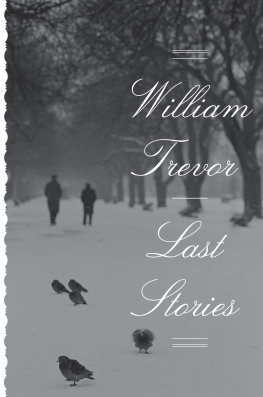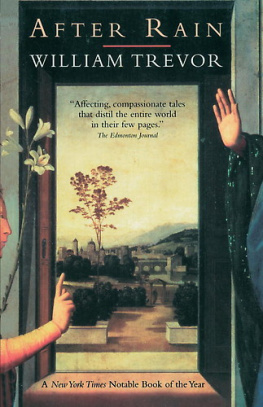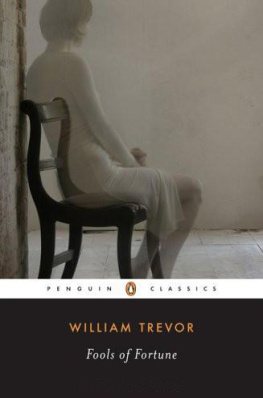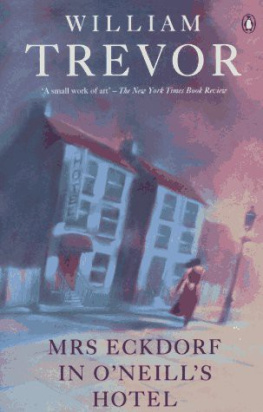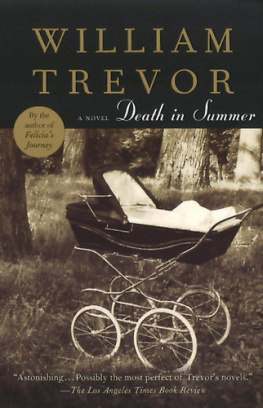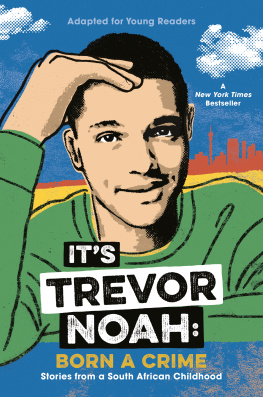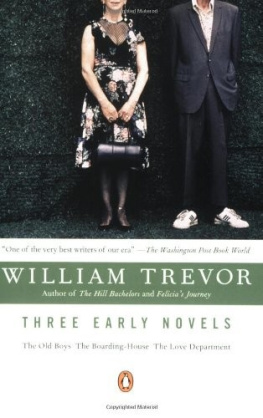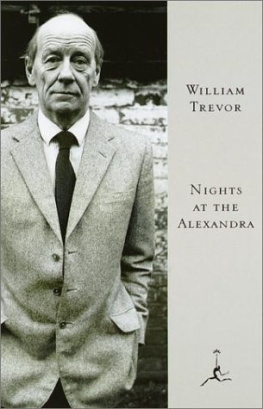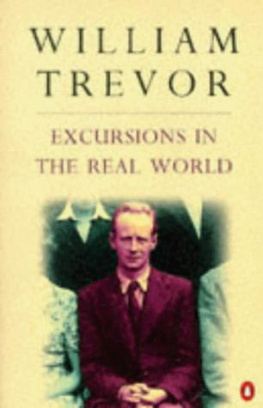By the same author
NOVELS
The Old Boys
The Boarding House
The Love Department
Mrs Eckdorf in ONeills Hotel
Miss Gomez and the Brethren
Elizabeth Alone
The Children of Dynmouth
Other Peoples Worlds
Fools of Fortune
The Silence in the Garden
Felicias Journey
Death in Summer
The Story of Lucy Gault
Love and Summer
NOVELLAS
Nights at the Alexandra
Two Lives
SHORT STORIES
The Day We Got Drunk on Cake
The Ballroom of Romance
Angels at the Ritz
Lovers of Their Time
Beyond the Pale
The News from Ireland
Family Sins
The Collected Stories
After Rain
The Hill Bachelors
A Bit on the Side
Cheating at Canasta
PLAY
Scenes from an Album
NON-FICTION
A Writers Ireland
Excursions in the Real World
FOR CHILDREN
Juliets Story
VIKING
An imprint of Penguin Random House LLC
375 Hudson Street
New York, New York 10014
penguin.com
Copyright 1995, 2008, 2011, 2012, 2013 by William Trevor
Copyright 2017, 2018 by The Estate of William Trevor
Penguin supports copyright. Copyright fuels creativity, encourages diverse voices, promotes free speech, and creates a vibrant culture. Thank you for buying an authorized edition of this book and for complying with copyright laws by not reproducing, scanning, or distributing any part of it in any form without permission. You are supporting writers and allowing Penguin to continue to publish books for every reader.
Making Conversation was first published in Great Britain by Penguin Books. The Piano Teachers Pupil, The Crippled Man (under the title The Woman of the House), Mrs. Crasthorpe, and The Women appeared in The New Yorker; The Unknown Girl in The Strand Magazine; Giottos Angels in The Sewanee Review; and An Idyll in Winter in The Guardian.
Names: Trevor, William, 1928-2016, author.
Title: Last stories / William Trevor.
Description: New York : Viking, 2018.
Identifiers: LCCN 2018013439 (print) | LCCN 2018018646 (ebook) | ISBN 9780525558118 (ebook) | ISBN 9780525558101 (hardback)
Subjects: | BISAC: FICTION / Short Stories (single author). | FICTION / Literary. | FICTION / Cultural Heritage.
Classification: LCC PR6070.R4 (ebook) | LCC PR6070.R4 A6 2018 (print) | DD 823/.914--dc23
LC record available at https://lccn.loc.gov/2018013439
These selections are works of fiction. Names, characters, places, and incidents either are the product of the authors imagination or are used fictitiously, and any resemblance to actual persons, living or dead, businesses, companies, events, or locales is entirely coincidental.
Version_1
Contents
The Piano Teachers Pupil
The Brahms? she said. Shall we struggle through the Brahms?
The boy, whose first lesson with Miss Nightingale this was, said nothing. But gazing at the silent metronome, he smiled a little, as if the silence pleased him. Then his fingers touched the piano keys and when the first notes sounded Miss Nightingale knew that she was in the presence of genius.
* * *
Now in her early fifties, slender, softly spoken, with a quiet beauty continuing to distinguish her features, Miss Elizabeth Nightingale considered that she was fortunate in her life. She had inherited a house on the death of her father, and managed without skimping on what she earned as a piano teacher. She had known the passion of love.
She might have married, but circumstances had not permitted that: for sixteen years she had been visited instead by a man she believed would one day free himself from a wife he was indifferent to. That hadnt happened, and when the love affair fell apart there had been painful regret on Miss Nightingales side; but since then she had borne her lover no ill will, for after all there was the memory of a happiness.
Miss Nightingales father, a chocolatier, being widowed at the time of her birth, had brought his daughter up on his own. They became companions and remained so until his death, although hed never been aware of the love affair that had been conducted for so long during his daily absences from the house. That love and her fathers devotion were recollections that cheered Miss Nightingales present solitude and somehow gave a shape to her life. But the excitement she experienced when her new pupil played for her belonged to the present, was fresh and new and intense: not ever before had she sensed genius in a child.
Just a little fast. She made her comment when the piece she had suggested came to an end. And remember the pianissimo. She touched the music with the point of her pencil, indicating where she meant.
The boy did not respond, but smiled as he had before. His dark hair, not cut too short, was in a fringe. The skin of his face was delicate, unblemished, as pale as paper. There was a badge on the breast pocket of his blazer, a long-beaked bird feeding its young. The blazer was navy blue, the badge red, all of it rather ugly in Miss Nightingales opinion.
Youll practise it just a little slower, wont you? she said.
She watched the boy reaching for the sheet on the music stand, standing up to do so. He dropped it into his music case.
Friday again? she said, standing up herself. Same time?
With eagerness that might have been purely polite but which she sensed was not, he nodded. His shyness was a pleasure, quite unlike the endless rattling on of her more tiresome pupils. Hed had several music teachers before, his mother had said, rattling on herself, so fast it was hard to understand why hed been moved from one to another. In a professional way Miss Nightingale had enquired about that, but nothing had been forthcoming.
She led the way from the room and handed the boy his cap from the hall-stand ledge, the same emblem of a bird on it. She stood for a moment by the open door, watching him close the gate behind him. His short trousers made her wonder if he was cold, his knees seeming vulnerable and fragile above grey woollen socks, the blue-and-red of his blazer and his cap repeated on the border. He waved and she waved back.
No other child was due that evening and Miss Nightingale was glad. She tidied her sitting room, reclaiming it after the weeks visitors, her own again until ten oclock on Monday morning when dull Francine Morphew came. Piano and sofa and armchairs crowded what space the room offered. Staffordshire figures of soldiers paraded on either side of a carriage clock on the mantelpiece. Pot lids and the framed trays of chocolate moulds her father had collected decorated the walls, among watercolours and photographs. Daffodils in vases were on the sofa table and on the corner shelf near the door.
When she had tidied, Miss Nightingale poured herself a glass of sherry. She would say nothing to the mother if the mother telephoned to ask how the boy was getting on. It was a secret to share with no one except the boy himself, to be taken for granted between them, not gone on about. The mother was a foolish kind of woman.
When Miss Nightingale had sat a little longer, she turned on the electric fire, for the April evening was chilly now. Warmly, happily, it seemed that years of encouragement and instruction offered for the most part to children without talent or interest had at last been rewarded. Within this small boy, so modest in his manner, there were symphonies unwritten, suites and concertos and oratorios. She could tell; she didnt even have to think.

